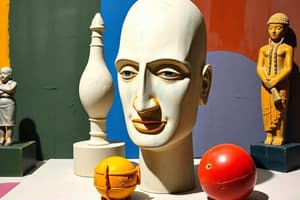Podcast
Questions and Answers
Artifacts are objects made by human beings that can only be mass produced.
Artifacts are objects made by human beings that can only be mass produced.
False (B)
Customs and traditions refer to the staple food that people in the community often eat.
Customs and traditions refer to the staple food that people in the community often eat.
False (B)
Government is responsible for implementing rules, keeping peace and order, and addressing conflicts in the community.
Government is responsible for implementing rules, keeping peace and order, and addressing conflicts in the community.
True (A)
Knowledge is primarily related to the physical tools used to improve task performance.
Knowledge is primarily related to the physical tools used to improve task performance.
Religion is defined as a strong belief in supernatural powers that control human destiny.
Religion is defined as a strong belief in supernatural powers that control human destiny.
Values are the morals that guide our actions and behaviors in society.
Values are the morals that guide our actions and behaviors in society.
Unilineal Evolutionism states that cultural forms pass through different stages of development, from Animism to Polytheism.
Unilineal Evolutionism states that cultural forms pass through different stages of development, from Animism to Polytheism.
Cultural Diffusionism asserts that culture originates from multiple culture centers.
Cultural Diffusionism asserts that culture originates from multiple culture centers.
Historical Particularism believes that each group of people has its own unique culture influenced only by geography.
Historical Particularism believes that each group of people has its own unique culture influenced only by geography.
Anthropological Functionalism suggests that cultural elements and practices are independent of each other.
Anthropological Functionalism suggests that cultural elements and practices are independent of each other.
Anthropological Structuralism conveys that cultural phenomena have no relation to each other.
Anthropological Structuralism conveys that cultural phenomena have no relation to each other.
Cultural Materialism considers that culture is influenced mainly by supernatural beliefs.
Cultural Materialism considers that culture is influenced mainly by supernatural beliefs.
Culture refers to an individual's taste, inclination, and interest in the 'fine arts'.
Culture refers to an individual's taste, inclination, and interest in the 'fine arts'.
According to Robertson, society is defined as a group of people sharing a common culture within a territory.
According to Robertson, society is defined as a group of people sharing a common culture within a territory.
Sociologists view society as an association organized by women within a territory.
Sociologists view society as an association organized by women within a territory.
Culture encompasses beliefs, practices, values, attitudes, laws, norms, artifacts, symbols, knowledge, and everything learned and shared as a member of society.
Culture encompasses beliefs, practices, values, attitudes, laws, norms, artifacts, symbols, knowledge, and everything learned and shared as a member of society.
In anthropological perspective, culture is perceived as a unique character of every human society that includes how people think, act, and what they own.
In anthropological perspective, culture is perceived as a unique character of every human society that includes how people think, act, and what they own.
Culture in sociological perspective is viewed as the imprint made by animals.
Culture in sociological perspective is viewed as the imprint made by animals.
Flashcards are hidden until you start studying
Study Notes
Definitions of Key Concepts
- Artifacts are human-made objects, especially those that can be mass-produced.
- Customs and traditions often highlight the staple foods commonly consumed in a community.
- Government plays a crucial role in enforcing rules and maintaining peace, as well as resolving community conflicts.
- Knowledge relates primarily to tools that enhance task execution.
Understanding Religion and Values
- Religion is characterized by a strong belief in supernatural forces that are believed to influence human fate.
- Values represent the principles that shape moral conduct and guide societal behavior.
Cultural Theories
- Unilineal Evolutionism posits that cultures evolve through stages: from Animism to Polytheism.
- Cultural Diffusionism theorizes that cultures emerge from multiple cultural centers rather than a single source.
- Historical Particularism emphasizes that each culture is shaped by its unique geography and history.
- Anthropological Functionalism views cultural elements as independent entities that interact functionally within a society.
- Anthropological Structuralism suggests that cultural phenomena are unrelated to each other.
- Cultural Materialism focuses on how culture is predominantly influenced by material conditions and beliefs.
Culture in Context
- Culture is understood as an individual's inclinations and appreciation for the fine arts.
- Society, according to Robertson, consists of people sharing a common culture within a specific area.
- Some sociologists define society as an association largely organized by women in a given territory.
- Culture encompasses beliefs, practices, values, attitudes, laws, norms, artifacts, symbols, knowledge, and all that is learned and shared within a society.
- From an anthropological view, culture uniquely defines each society by influencing thought, actions, and possessions.
- In sociological terms, culture is perceived as the resultant imprint created by animals.
Studying That Suits You
Use AI to generate personalized quizzes and flashcards to suit your learning preferences.




